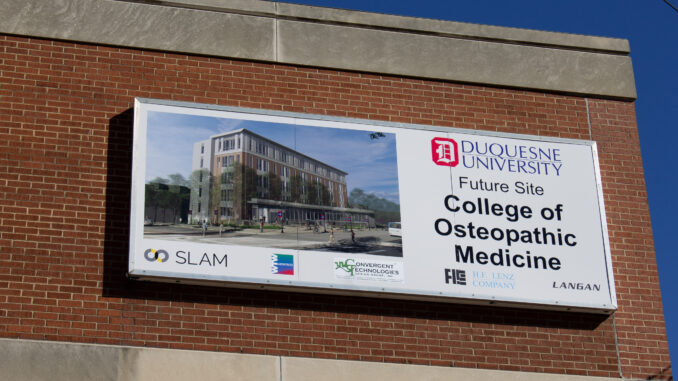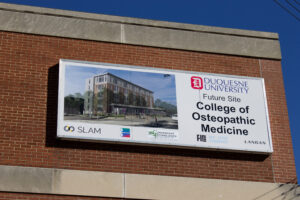
Kellen Stepler | editor-in-chief
10/15/2020

Duquesne’s newest school of osteopathic medicine is still on track to open in 2024
In a season of cancellations and postponements, Duquesne’s new College of Osteopathic Medicine remains on track to open in 2024 at 1323 Forbes Ave.
Duquesne provost David Dausey, along with founding dean of the College of Medicine John M. Kauffman Jr., held an update of the college’s progress on Friday, Oct. 9. The college will be Duquesne’s first new college in over 20 years, and the first Catholic medical school in Pennsylvania.
“Duquesne sets a high bar to begin with, and we expect the School of Medicine to be no different,” Kauffman said.
“The school is currently in applicant status — the first stage in the journey to become fully accredited,” Kauffman said. “The earliest they can enter the next phase, candidate status, is the summer of 2021. Summer 2023 is the earliest they can enter pre-accreditation status.”
Dausey said that the College of Medicine “fits squarely” with Duquesne’s mission statement and the idea to educate the body, mind and spirit. It also allows Duquesne to expand their work in urban and rural underserved areas and communities throughout western Pennsylvania. The focus, he said, will be on recruiting a diverse, inclusive student body.
“The opportunity of being in an urban setting is very exciting for me,” Kauffman said. “I was in a rural setting in North Carolina and we did a lot of work with migrant farmworkers, but I’m very excited at this time to really be working in urban and rural areas.”
A New Castle native, Kauffman said that the college will matriculate its first class of 75 students in August 2024; with 112 students the next year, 150 students the next two years and then 162 students in the fifth year.
He also went through the blueprint of the 80,000 square-foot building — with more than 12,000 square feet of classroom space, and more than 20,000 square feet of space for anatomy labs, simulation exam rooms and virtual reality studios.
“We’ve also spent a lot of time focusing on helping marginalized populations and particularly those that lack access to care, and our goal is to train students who are going to be servant leaders in the field of health care,” Dausey said. “We want to extend that to medicine, and we also want to add medicine to interprofessional training that we do here at Duquesne, so that we can augment our interprofessional training opportunities.”




